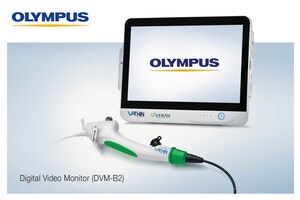Smithsonian and Olympus Team Up for Q?rius - A Comprehensive Educational-Scientific Experience for the American Public
"I have no special talents. I am only passionately curious." --Albert Einstein
CENTER VALLEY, Pa., Dec. 10, 2013 /PRNewswire/ -- Olympus, a global technology leader in imaging solutions for healthcare, life and materials science and consumer electronics products, is partnering with the Smithsonian, the world's largest museum and research complex, to create Q?rius (pronounced "Curious"), a new hub of scientific activity and education based at the Smithsonian's National Museum of Natural History (NMNH) in Washington D.C. Olympus is supporting Q?rius, the comprehensive 10,000-square-foot experiential learning center, with a donation of dozens of microscopes and imaging systems that will enable museum visitors, along with remote participants, to access more than 6,000 bones, minerals and fossils in the NMNH's collection and engage in active, ongoing scientific inquiry.
Q?rius is a first-of-its-kind interactive and experimental environment. Through involvement with scientists and interactions with thousands of authentic objects, visitors will experience how science is relevant to them and how they can develop the skills to become the scientists of tomorrow. Q?rius is designed so that students and other visitors will contribute to the world's body of scientific knowledge and participate in investigating actual research questions by working with actual research objects. A key part of the process is that students, with help from Smithsonian scientists, will use professional-level microscopes and other instruments to probe and study specimens that get them engaged in and excited about the scientific process.
"We are grateful to Olympus for their generous donation of software, accessories, manpower and high quality microscopes to Q?rius," said Elizabeth Duggal, Associate Director for Public Engagement at the NMNH. "Through their support we are able to offer students the unique opportunity to examine collections using the same scientific instruments that Smithsonian researchers do every day. We're fortunate to have a partner like Olympus who shares our vision of inspiring the next generation of scientists to become better stewards of our natural world."
Olympus is contributing significantly by the donation of more than 50 fully loaded, professional scientific microscope imaging systems, along with a variety of cameras, monitors, PCs, stands, software and more. As part of its donation, Olympus is providing a DSX100 opto-digital imaging system, a free-angle wide-zoom microscope that combines cutting-edge optical performance with the operational convenience of a smartphone or tablet. The DSX100 will capture detailed 3D images of specimens for archiving and online access, enabling people to participate in aspects of the Q?rius experience from anywhere in the world. Other key instruments donated include a comprehensive BX63 life science research microscope system equipped with fluorescence and differential interference contrast illumination optics and an advanced research digital camera; a BX53 life science research microscope configured for polarized light microscopy; several BX43 upright compound teaching microscopes, each equipped with five viewing heads for teaching and group observation; and dozens of stereo and dissecting microscopes set up throughout the Q?rius space for use by visitors and school groups. As an added benefit, users will be coached and mentored in using the equipment by Smithsonian scientists and trained educator-volunteers. Along with hardware and software, Olympus is providing extensive staff time for training and support.
"It is an honor to be part of the vital Q?rius program. We are proud to help members of the public participate in the scientific process in collaboration with The Smithsonian, and, through their experience, be inspired to support scientific research and to pursue careers in science," said Hidenao Tsuchiya, President, Scientific Equipment Group, Olympus Corporation of the Americas. "Olympus has roots in innovation, healthcare and service to humanity that go back nearly a century. Today, supporting science education is one of our top corporate priorities, and we are a natural fit with the goals and challenges of Q?rius."
Q?rius, located on the ground floor of the museum at the north entrance on Constitution Avenue N.W., will open to the public on Dec. 12. Olympus equipment has already arrived at the Museum and the full complement of instruments will be in use by the end of December.
For more information about Q?rius, visit http://qrius.si.edu.
About Olympus America Inc., Scientific Equipment Group
Olympus America Scientific Equipment Group, a division of global technology leader Olympus, provides innovative microscope imaging solutions for researchers, doctors, clinicians and educators. Olympus microscope systems offer unsurpassed optics, superior construction and system versatility to meet the ever-changing needs of microscopists, paving the way for future advances in life science. Its industrial division produces innovative test, measurement, inspection and imaging instruments used for quality control, R&D and other technical applications. Olympus' portfolio of micro-imaging and metrology systems supplies reliable, economical solutions designed to enhance safety, security, quality and productivity.
About Olympus
Olympus is a global technology leader, designing and delivering innovative imaging solutions in its core business areas:
- Medical and Surgical Products: Gastrointestinal endoscopy, minimally invasive surgical products, and accessories
- Life Science Imaging Systems: Advanced research, clinical/educational microscopes, and research/educational digital imaging systems
- Industrial Measurement and Imaging Instruments: Industrial research, engineering, test, inspection and measuring instruments
- Cameras and Audio Products: Digital cameras and voice recorders
Through this technology, Olympus focuses on enhancing people's lives every day and helping people enjoy the continuum of life. For more information, visit www.olympusamerica.com.
About the Smithsonian's National Museum of Natural History
The Smithsonian's National Museum of Natural History is the most visited natural history museum in the world. Opened in 1910, the museum on the National Mall is dedicated to maintaining and preserving the world's most extensive collection of natural history specimens and human artifacts. It also fosters significant scientific research and educational programs and exhibitions that present the work of its scientists to the public.
SOURCE Olympus America Inc.
WANT YOUR COMPANY'S NEWS FEATURED ON PRNEWSWIRE.COM?
Newsrooms &
Influencers
Digital Media
Outlets
Journalists
Opted In





Share this article